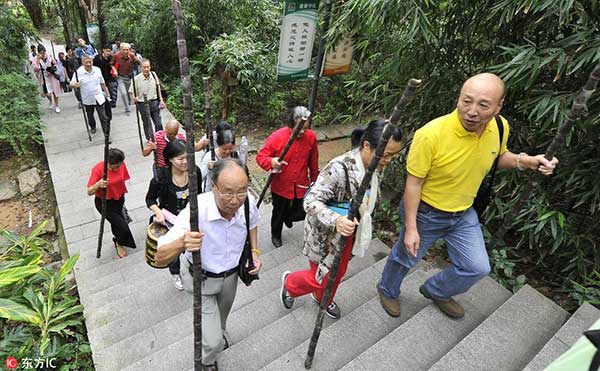 |
|
[Photo/IC] |
Climbing heights
People like to climb heights (mountains) on this festival, so Double Ninth Festival is also called "Mountain-climbing Festival".
The 9th lunar month, with clear autumn skies and bracing air, is a good time for sightseeing. An outing lover, who stands on a height looking afar this month, will have a panoramic view of a blue sky with pale clouds and dark green mountains, which makes him or her carefree and joyful.
So people, both ancient and present, love to go sightseeing this month. People in the Western Han Dynasty (206 BC-25 AC) liked to ascend heights in the suburbs of Chang'an (the then national capital and present Xi'an) on the 9th day of the month to enjoy scenery, the activity being known as height ascending. People in the Three Kingdoms period (220-265) and the Jin Dynasty (265-420) liked the activity to feast their eyes on the autumn country view even more.Sightseers in the Chang'an liked to hike a man-made tourist attraction with the Qu'jiang Pool, the Ci'en Temple and the Wild Goose Pagoda to its southwest. The Ming Dynasty (1368-1644) emperors liked to ascend the Wanshou Hill in Beijing to mark the day, and the Qing Dynasty (1616-1911) emperors chose to ascend the man-made hills in the imperial garden in Beijing.
It is really refreshing to climb mountains and enjoy the beauty of nature during this bright and clear time in autumn.
Apart from expelling bad luck and disasters, climbing mountains also indicates "climbing to a higher position", and it is also an important reason why ancient people pay attention to this custom. Another reason that climbing mountains is valued by people, especially by the elderly, is that it means "climb to a longevous life".